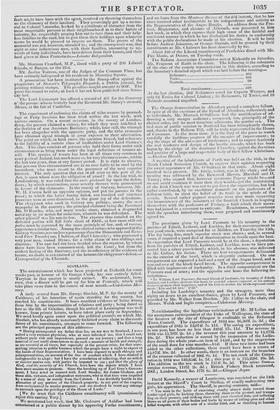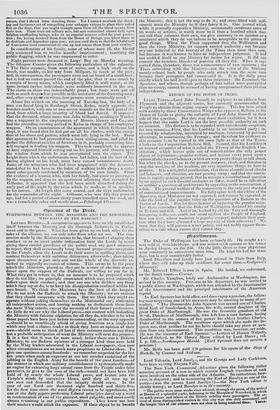David Kennedy, a weaver of Laurieston, was convicted on the
14th instant at the Sheriff's Court in Stirling, of cruelly maltreating two girls, his apprentices. The Sheriff, in passing sentence, said- " You were in the habit of exercising cruelty almost daily toward those tender-aged girls, by kicking them, throwing them to the ground, and tramp.. ling on their persons, and striking them with your clenched fists, and inflicting blows on all parts of their bodies and limbs by means of rolling-pins and other lethal weapons, with other acts of a similar kind, and so shocking to human
nature, that I shrink from detailing them. Yet I cannot overlook the shock- ing and barbarous act of compelling your unhappy victims to place their naked feet on the floor, that you might trample upon them till the blood sprung from their toes. These were nut solitary acts, but acts committed almost daily upon helpless unoffending beings, who in an especial manner called for your protec- tion ; for, having received them from the House of Refuge, you knew them to be destitute and dependent upon you ; yet you used them so that the inhabitants of Laurieston were constrained to rise up and rescue them from your cruelty."
In consideration of his family, some of whom were ill, the Sheriff only sentenced him to twelve months' imprisonment ; remitting the public flogging, which he was empowered to order.
Eight persons were drowned in Largs' Bay on Monday morning. The Glasgow Courier gives the following particulars of the calamity. " The Hero steamer, from want of water, and a high swell on the beach, was unable, on her way from Millport, to touch at the pier ; and, in consequence, the passengers went out on board of a small boat ; but it had no sooner passed the end of the pier, than it was struck by a couple of heavy waves, which completely filled it with water ; at the same instant twelve individuals were suddenly immersed in the sea. The alarm on shore was indescribably great ; but boats were put off with as much despatch as possible to the assistance of the drowning men ; and, after very great exertions, thur persons were eventually saved."
About five o'clock on the morning of Tuesday last, the body of a man was found lying in Roxburgh Street, Kelso, nearly opposite the butcher-market, with one or two severe wounds on the back part of the head, from which a large Quantity of blood had flowed. It appeared that the deceased, whose name was John Gilhome, residing in Virooler, was a waggoner in the employment of Messrs. Howey and Co., and had the preceding evening arrived in Kelso in charge of his employers' waggon. On an examination of the apartment in which Gilhome had slept, it was found that he had put on all his clothes, with the excep- tion of his shoes and gaiters, which were left lying in the bed. From this apartment he had proceeded to a front sitting-room, and piled to- gether the different articles of furniture in it, probably conceiving him- self engaged in loading his waggon. This task completed, he appears to have supposed himself setting out on his journey, and thrown open the window from which he was precipitated into the street. The height from which the unfortunate man had fallen, and the fact of his baying alighted on his bead, must have caused instantaneous death. Some of the witnesses who had been acquainted with the deceased, stated, that he had been in the habit of walking in his sleep ; a state- ment subsequently confirmed by members of his own family. From the evidence of a woman who, with her family, had come as passengers by the waggon, and slept in an apartment adjoining that occupied by ("Mime, it appeared that she had been much disturbed during the early part of the night by the noise which he made, as if in speaking to his horses. At length this noise ceased, and she slept undison bed for the remainder of the night. Gilhome, who was fifty-live years of age, had for a period of about thirty years travelled upon the road, and was a remarkably sober and steady man.—Edinburgh Observer.



























 Previous page
Previous page